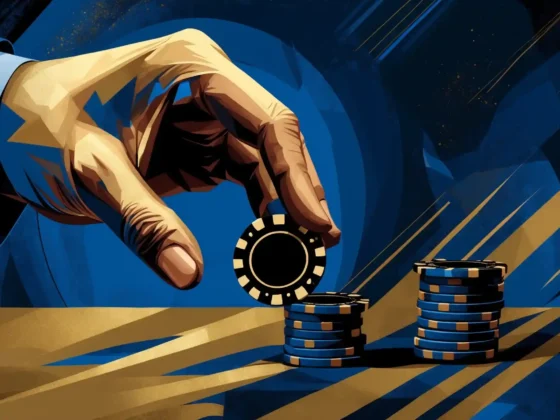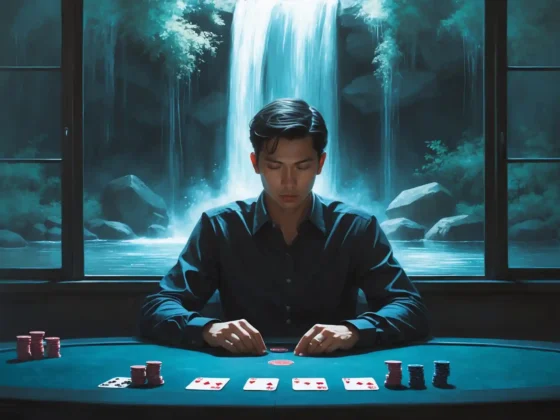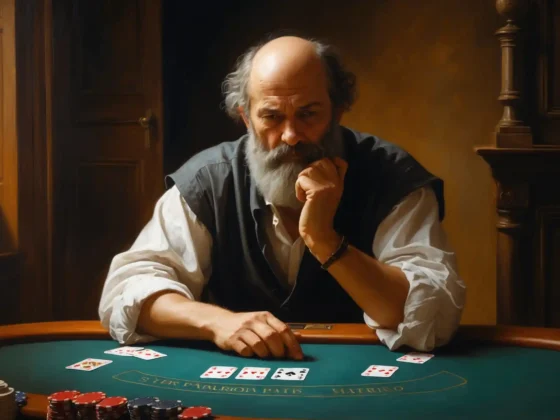Poker. It’s a game of skill, luck, and nerves. One minute you’re riding high, the next you’re staring down a monster hand and wondering if you should even bother breathing. It’s easy to let emotions take the wheel – frustration, anger, even despair can cloud your judgment and lead to costly mistakes. But what if there was a way to stay calm, focused, and in control, no matter what cards the universe throws your way?
Enter Stoic Mindfulness in Poker. This isn’t about suppressing your feelings; it’s about understanding them, acknowledging what you can control (your thoughts, your decisions), and letting go of what you can’t (the cards, your opponents’ actions, the sheer randomness of it all). Think of it as finding your inner zen at the table, a place of calm amidst the chaos.
“Remember that you must act as a Roman. And what does a Roman do?” pondered Marcus Aurelius, the Stoic Emperor. “He sees to it that his social and civic duties are performed, that he is just and fair to his fellow humans, that he treats them with compassion and honesty.” In poker, this translates to playing with integrity, respecting your opponents, and focusing on your own game rather than getting caught up in the emotions of the moment.
Imagine this: You’re facing a tough decision. Instead of panicking, you take a deep breath, recalling the Stoic principle of focusing on what’s within your power. “It’s not what happens to you, but how you react to it that matters,” Epictetus reminds us. You analyze your options calmly, considering the probabilities and the potential outcomes. You make a decision, and regardless of whether it wins or loses, you accept the result. “Remember that you must act as a Roman. And what does a Roman do?” pondered Marcus Aurelius, the Stoic Emperor. “He sees to it that his social and civic duties are performed, that he is just and fair to his fellow humans, that he treats them with compassion and honesty.” In poker, this translates to playing with integrity, respecting your opponents, and focusing on your own game rather than getting caught up in the emotions of the moment.
Beyond the Cards: Life Lessons from the Felt
Stoic Mindfulness in Poker isn’t just about winning more hands. It’s about cultivating a stronger, more resilient mind. It’s about learning to navigate life’s ups and downs with grace and composure. Just like in poker, life throws curveballs. Unexpected setbacks, disappointments, and challenges are inevitable. But by embracing Stoic principles, you learn to roll with the punches. You learn to view setbacks as opportunities for growth, to find strength in adversity, and to appreciate the journey, not just the destination. As Marcus Aurelius observed, “The impediment to action advances action. What stands in the way becomes the way.”
Practical Tips for Bringing Stoicism to the Table
- Mindful Breathing: When the pressure mounts, take a few deep breaths. Focus on your breath, letting go of the tension and bringing yourself back to the present moment. “Nature gives you the means to live. It is up to you to use them.” – Marcus Aurelius.
- Visualization: Before a session, visualize yourself playing confidently, making smart decisions, and staying calm under pressure. “Very little is needed to make a happy life; it is all within yourself, in your way of thinking.” – Marcus Aurelius.
- Embrace the Unknown: Accept that you can’t control everything. Focus on what you can control: your strategy, your discipline, your emotional responses. “The chief task in life is simply this: to identify and separate matters so that I can say to myself regarding the external obstacle, ‘It is no obstacle to me,’ and regarding the moral obstacle, ‘It is within my power to remove it.’” – Epictetus.
- Learn from Every Hand: Analyze your plays, both good and bad. Identify areas for improvement and use each hand as an opportunity to grow. “If you are distressed by anything external, the disturbance is not due to the thing itself, but to your estimate of it; and this you have the power to revoke at any moment.” – Marcus Aurelius.
- Find Joy in the Journey: Poker is a game of skill, but it’s also a game of chance. Enjoy the process of learning, the challenge of competition, and the satisfaction of making a good play. “Live a good life. If there are gods and they are just, then there’s no need to fear them. If there are gods and they are unjust, then there’s no need to fear them. If there are no gods, then there’s no need to fear them.” – Epicurus.
Stoic Mindfulness in Poker isn’t about becoming emotionless. It’s about harnessing your emotions, cultivating a sense of inner peace, and playing your best game, regardless of the cards you’re dealt. It’s about finding your inner zen at the table, and discovering that the lessons learned at the poker table can be applied to every aspect of your life.
By embracing Stoic principles, you can transform your poker experience from a battleground of emotions to a journey of self-discovery and growth. As Marcus Aurelius observed, “The happiness of your life depends upon the quality of your thoughts: therefore, guard accordingly, and take care that you entertain no notions unsuitable to virtue.“ Cultivate a mind that is focused, resilient, and accepting, and you’ll not only improve your game but also enrich your life beyond the felt.











3 comments